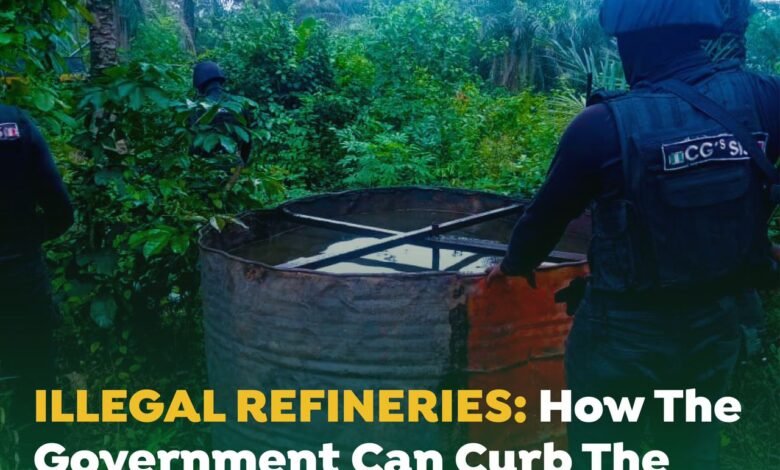
Like illicit drugs, child labour, and baby factories, illegal refineries are a national menace Nigeria’s governments and host communities have been contending with over the years. However, despite the news of discoveries and crackdowns on illegal refineries in the Niger Delta region of the country annually by the concerned authorities, the illicit and dangerous business has continued to grow in leaps and bounds at the expense of the most populous African nation and its people.
Mostly sited in the forests and villages of Abia, Imo, Rivers, Bayelsa, Ondo, and other oil-rich states in Nigeria, environmentalists say illegal refineries impact the ecosystem negatively. Oil spills from these refineries contaminate the water with hydrocarbons, making it unsafe for drinking, washing, and irrigation.
The fumes from the burning crude oil pollute the air, causing respiratory problems like asthma and lung cancer for residents in surrounding communities. In some cases, the fires from these illegal refineries can burn for days, wiping out vast swathes of vegetation and displacing wildlife.
In addition, Illegal refinery is also said to sabotage the country’s economy. Recent reports show that Nigeria loses 10% of its daily oil production to illegal activities.
Between 2022 and the date, the Nigerian National Petroleum Company Limited disclosed that it had deactivated about 6,800 illegal pipes connected to illegal black gold refiners across the oil-rich states in the country. Decrying the deluge oil theft, the Group CEO of the NNPC, Mele Kyari, in May said, “These things don’t just happen from the blues. They happen in communities and locations we all know. As we remove one illegal connection, another one comes up. It is sad.”
Similarly, Nigeria’s National Security Adviser, Nuhu Ribadu, in a visit to the oil and gas facilities in Rivers and Abia states in August, equally lamented the damage the operators of illegal refineries are intentionally doing to the country’s economy every day. Ribadu revealed that Nigeria loses an average of 400,000 barrels of crude per day to oil thieves.
Nigeria’s illegal refineries and explosion
Reports have shown that aside from inflicting harm on the ecosystem and sabotaging the country’s economy, people working on illegal refinery sites are sometimes killed by explosions. The PUNCH reported in October 2023 that between 2021 and 2023, no fewer than 204 lives were lost to explosion at illegal refinery sites. Workers at these illegal sites often lack proper training and safety equipment, making them especially vulnerable to accidents.
Why illegal refineries keep emerging despite crackdowns
Community leaders and security agents who the government deployed to monitor the country’s pipeline and bring oil thieves to book have been indicted for the surge in illegal refineries in Nigeria. The NSCDC Public Relations Officer in Rivers State, Olufemi Ayodele, said that illegal refineries being destroyed later resurface because some community leaders connive with the operators of the illegal business.
Prof. Ayo Ayoade has also accused Nigeria’s conventional and private security agents of collaborating with owners of illegal refineries to sabotage the country’s economy. “Some of the people that are supposed to be securing those environments are also participating or collecting bribes from the people in illegal refining,” the Professor of Energy Law at the University of Lagos (UNILAG) alleged.
In 2022, the former President Muhammadu Buhari administration offered Ekpemupolo, also known as Tompolo, billions of naira to monitor the country’s pipeline and apprehend vandals. However, the former leader of the defunct militant group, Movement for Emancipation of Niger Delta’s security outfit, was accused of fraternizing with some of the owners of the illegal business.
Environmentalists note
While environmentalists laud the security agents who have been actively cracking down on discovered illegal refineries across the oil-rich states in the country, they note that burning them down is not the best method to deactivate them as doing so will have a negative impact on the environment. “When you start burning, it spills oil into the water; you destroy the aquatic life of the communities; you destroy the air, the water, and you destroy the underground. It’s not desirable at all,” Mr Ola Oresanya, the Commissioner for Environment in Ogun State, noted.
Nipping the menace in the bud — Experts
Experts commend the government for destroying the various illegal refineries in the country. However, they say that to curb the menace totally, the government must enact a stringent law against its operators.
They contend that most of the culprits caught in the past were not made to face the full force of the law. Experts also urged the government to increase the take-home of security agents. They argue that the security agents connive because they’re not well-funded.
Another solution to nip the menace in the bud, according to experts, is that the government should enter cooperative ownership with the host communities. “The Federal Government cannot own the entire resources. It must be cooperative ownership of natural resources. We must amend our constitution. If the community has an ownership stake, if the state government has an ownership stake, and if the Federal Government has an ownership stake, they can defend their rights,” Professor Ayoade posited





